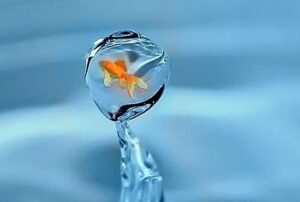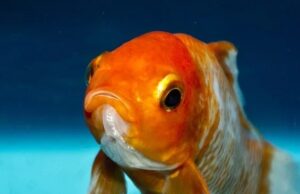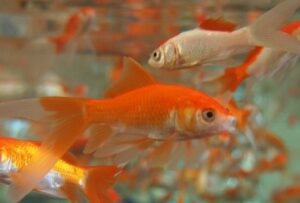Just as troubles in life can take a toll on humans, fish can get stressed out too. The interplay of several environmental factors can seriously disturb your fish.
People often ask, “Why is my fish not eating or swimming?” or, “Why is my fish swimming strangely?” The reason is almost always stressed.
A stressed-out fish will give clear cues to any observer regarding its situation. It will gasp its mouth at the surface of the water, meaning that water quality has declined. It may refuse to eat even if it hasn’t had a meal in quite some time.
The swimming patterns will become erratic, i.e., frantic movements or crashing at the bottom.
There are numerous reasons for such behavior. Let’s dive in and analyze each one of them.
Water Quality For Fish Tank
You can leaf through any number of fish care guides, and each of them will point out the importance of water quality, perhaps at the top, like in this article.
Water is more than just a fluid medium for fish; it is the lifeline of fish. They draw it in from their mouths to breathe in it via their gills, excrete in it, and live in it.

You cannot compromise upon water quality; this is the single most important environmental factor that affects fish’s health.
This can be a problem as most fish are messy beings. They produce highly toxic ammonia as their primary waste product, which can create a heap of problems if not filtered out properly.
Similarly, the concentration of dissolved oxygen, water temperature, the presence of chemical pollutants, and fluctuations in the pH can cause serious harm.
If your aquarium is adequately equipped and you still suspect that there is such a problem, you can test the water with any decent water quality test kit available in an aquarium shop.
How do I get better water quality in my fish tank?
Since germs use up the trace element in the water and, by adding new water weekly, you replace these minerals. By eliminating water, you decrease the amount of nitrate that builds up in the water as well. Weekly water replacement likewise helps remove other poisonous substances or pollutants that can easily build up in the aquarium tank.
Can drinking water be used for fish tanks?
It is actually advised that detoxified water be made use of instead of distilled water. Faucet water may be actually made use of, however, it needs to be actually treated to eliminate chemicals that are actually potentially harmful to fish.
Fish Diseases + Treatments

Viruses, bacteria, protozoa, fungi, and nematodes are some of the deadliest fish parasites that can cause extreme duress to your pet. You can never be careful enough when introducing a new fish to your tank, as this is the most common way for these parasites to gain entry to an aquarium.
Below, you can find a list of diseases and treatments in case your fish ever seems to be off.
| Diseases | Symptoms | Treatment |
|---|---|---|
| Aeromonas/Pseudomonas | The symptoms from this disease can cause your fish to have red fins/skin, bulging eyes, swollen abdomen, sored skins, and tattered tail and fins. | Treat your fish by separating the infected or potential infected goldfish and add antibiotics to your fish tank. It’s also recommended to use antibiotic food that is medicated. |
| Flavobacterium | The symptoms of flavobacterium can sometimes cause a goldfish or any other fish to have fuzzy spots on their skin or even mouth. | To treat this disease, you should immediately remove your goldfish and separate it from your fish tank. Start using medicated antibiotic meals for your tank as well as adding antibiotics to your tank. |
| Carp Pox | The symptoms of carp pox are typically bumpy growths on the fish’s skin and its fins. | The treatment for carp pox is to find affected areas and treat them with topical disinfectants. It’s recommended that you add a Formalin solution to your aquarium tank as well. |
| Lymphocystis | The symptoms of Lymphocystis are white pimple-looking on the fish’s skin and possibility even their fins. | The treatment is similar to carp pox. You will have to locate affected places and treat them with topical disinfectant. Don’t forget to add Formalin to your tank. |
| Water Mold | The symptoms of water mold for your fish is having cotton-looking “hair” growing on your fish or fish food. | To treat this disease, you should treat your aquarium water with Methylene Blue, Acriflavine, Victoria Green, or Malachite Green. |
| Costia, Chilodonella, Trichodina, Epistylus | The symptoms of these parasites in a fish can be grayish or white “slime” on your fish’s skin, fins being clamped, the increase of gill movements, or finding that your fish is lying on the bottom of your tank. | As for the treatment of this disease, make sure that you add a Formalin solution to the water. You should also check out Acriflavine, copper sulfate, or Malachite Green. |
| Ich | The symptoms of ich on a fish can be white spots on the fish’s body/fins. If you notice your fish is scraping its body against rocks or other stuff in your tank, then there’s a possibility that your fish is dealing with ich. | To treat ich, make sure to add Acriflavine, copper sulfate, Malachite Green, or Formalin. |
| Velvet Disease | You can recognize the symptoms of velvet disease when you notice there are golden spots on the skin of your fish. | To treat velvet disease, make sure that you treat your aquarium water with copper sulfate. |
| Hole-In-The-Head Disease | You can recognize the disease if your fish has spots on its back or at the top of its head. | To treat this disease, it’s advised that you should feed your fish any food that has Metronidazole. |
| Camallanus Worms, Capillaria Worms | You can recognize the symptoms of the Camallanus Worms/Capillaria Worms when your fish is experiencing weight loss and if you’re noticing poor growth. | You can treat this disease by adding Levamisole to your fish’s food and make sure that you feed medicated meals that are anti-parasite. |
| Gill Flukes, Skin Flukes | To spot this disease on a fish, you will have to recognize if your fish has inflamed gills, mucus on your fish’s skin, and if you notice any behaviors like your fish scraping against rocks or other materials in the tank. | You can treat this by adding Praziquantel to your aquarium tank and feeding your fish with medicated anti-parasite food. |
| Anchor Worms | To recognize the symptoms of anchor worms, you have to see if your fish has a grayish/white worm-looking parasites on the skin of your fish. | You can treat it by carefully taking out your fish and removing any parasites that are visible using tools like tweezers. Another step to take is to add Trichlorfon or Dimilin to the water of your tank. |
| Fish Lice | To recognize the symptoms of fish lice, you can check if your fish has tiny moving specks around your fish or if it’s in the water of your aquarium tank. | You can treat it by adding Trichlorfon or Dimilin to your aquarium water. |
| Lack Of Oxygen | With the lack of oxygen, you’ll notice that your goldfish stay near the top of the water to gulp for air and you’ll also notice quick gill movements. | The treatment is simple. Make sure that you have a working filter and change your tank water if necessary. |
| Poor Water Quality | The symptoms for poor water quality cause your goldfish to have rapid movements when it comes to their gills, gills that are inflamed, mucus, fins clamping, and you’ll find that your fish will lie at the bottom of your aquarium. Sometimes, this can cause the death of many fish in that same aquarium. | To treat your water and ensuring better quality for your fish, treat your tank water with ammonia remover. Find other products that can improve the quality of water in your tank. |
Whenever you buy a new fish, you must keep it separately for a few days in quarantine, closely inspecting it for any signs of stress. Once you’ve ascertained that the fish is perfectly healthy, only then put it with the rest of your pets.
However, if your pet has acquired a disease, there is no room to panic; you must act! A few diseases may have specific symptoms, but only an expert can properly diagnose others.
Consult the closest pet veterinarian, and proceed with the suitable treatment to cure your fish.
How do you treat a sick fish?
To treat a sick fish, you will need to first isolate your fish. Once that’s completed, try to add antibiotics to your aquarium and fish food that are medicated. If you notice that any fish is showing signs of disease, immediately remove your fish and keep it away from other fish.
Should I kill my dying fish?
If your fish has been actually dealing with a serious sickness and none of the therapy techniques have been actually functioning, euthanasia could be the best option. It might appear severe to finish your fish’s life, but it may really be actually the kindest trait you can possibly do– specifically if the fish is actually stressed and suffering.
Fish Dealing With Problems With Food
Perhaps there is nothing wrong with your fish. If it just refuses to eat the flakes you’ve been feeding it, maybe it just doesn’t want those anymore.

The same problem can arise if your fish food has gone bad. You can preempt this by checking the expiry date at the time of purchase and storing it properly.
Maybe something you fed it earlier led to a gut blockage. If you try different foods and the animal shows no response, contact the vet.
What do you do if your fish is not eating?
If you’re supplying your fish too much, it may appear that they may not be eating. See to it you’re offering the proper quantity. Watch your fish when you feed them to analyze usage as well as behavior. If a veterinarian dismisses health and wellness concerns, attempt different labels of meals on choosy eaters to see if your fish’s hunger enhances.
How to tell if your fish is hungry?
You can tell when your fish is hungry if they begin digging around, waiting at the top, becoming more aggressive, or showing different behaviors.
From VivariumTips,
Once you’ve ascertained that your fish is under stress, act immediately to make things better. Don’t expect the situation to make itself better; it won’t. Narrow down the causes and take the appropriate steps, but if you are unsure, contact the nearest veterinarian.
Remember that your pet’s health is your responsibility, and there is no room for negligence in this matter.
For articles related to “Why Is My Fish Not Eating Or Swimming,” check out:

